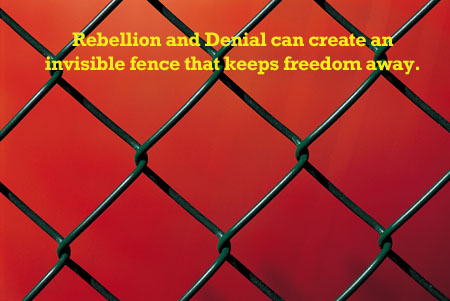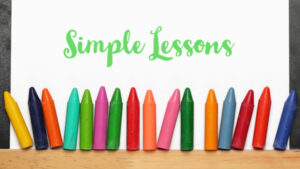Are We Really Letting Go?
Taking action to fix a situation is fixing the effect of our beliefs, not letting go. We’re often so used to fixing effects that we don’t even think to let go first. Now that being said, we will probably continue to take actions to fix some effects for awhile. Some problems have so much power that we have to gain proficiency in letting go and trusting our emotions before we don’t need to take any action at all. Nevertheless, it’s important that we recognize if we’re fixing effects. In this way, we can still let go after the fact and continue moving toward freedom.
For most of us, there are obvious problems that we know we must let go. They’re in our face; and we can see that we need to let go of our beliefs around these issues. Then there are problems or beliefs that we deny or rebel against.
We usually deny beliefs because we’ve become so proficient at fixing them with action or compensating beliefs that we forget we’re fixing effects. We’re sure we no longer believe the things that we’re still fixing. But if we stop fixing the effect for some reason, we’ll be reminded of that belief. Let’s say we believe in evil, but we believe our religion will keep us safe from it. Then we leave that religion, and we fear evil again. In denial, we pretend a belief that we clearly hold as true doesn’t exist in our mind. Denial facilitates projection. When we deny beliefs, we see them in others but not in ourselves. We often judge those who act out our beliefs.
In rebellion, it feels as if the belief is coming at us from others. We have beliefs in our mind that say we must believe what some other person believes. We can’t see that we hold the causal belief that allows this person into our mind. Usually they’re an authority in our life. We often think we can’t let go of their belief, so we do the opposite.
Rebellion
Many people think they are no longer rebelling when their opponent has stopped fighting. The non-action appears to indicate resolution. But we’re stuck on one side of the bottom of the triangle mentally with our opponent silently holding the opposite. Justifying our position or saying we won can look a lot like freedom, but it isn’t.
Let’s say that our mother wants us to go to college. We don’t go; in time, our mother doesn’t bring up the topic anymore. It’s easy to think that we’ve resolved this issue. But we haven’t. College becomes the elephant in the room. Our mother is always looking for a reason to point out what she perceives as our error.
Fortunately, if one lets go of the bottom of the triangle, the other must. We dissolve the false self connection. We must look at why we believe our mother’s beliefs or judgments of us. If we see her beliefs or judgments as false, they will lose all power. We’ll know without a doubt that our True Self guided us perfectly.
The best way that we can prove the rightness of our True Self is to let go of whatever others throw at us. We must know that what they throw our way isn’t true for us. People will do this until we can’t be rattled anymore. Then they stop. The elephant leaves the room.
Denial
Denial is a coping mechanism of our false self. We’re living in a situation that we hate, but we tell ourselves it’s the way life is or we need to accept what is. We need this job. We’ll be lonely if we leave the marriage. We might say we’re good for putting up with something that isn’t acceptable to us. We might believe we don’t deserve more. Often denial is masked in words of forgiveness or in trying to sound nice. Denial is often a sign that we’ve become good at losing.
I was taught that being a good loser was virtuous. I was told to considered losing part of life…you win some and you lose some. But then I realized that win-lose wasn’t normal or true. I had to let go of all my goodisms that made other people’s winning at my expense right — sayings like “accept what is” or “they did the best that they could” weren’t true. We weren’t designed to accept intolerable situations, judgment from others, or living in small boxes. We aren’t doing the best we can if we are living from beliefs.
The key to my relief was in recognizing that my True Self sorted the world based on true and false. I wasn’t making someone bad or wrong by not believing them. I was just choosing my own freedom; they could choose what they wanted for themselves. Realizing that beliefs are false regardless of who imposes them on us is what frees us.
Ultimately, our life belongs to us. It’s our journey, and we were meant to live from our True Self. When we rebel against a belief that another possesses and tries to impose on us, or we deny that we have a belief, we remain stuck in the illusion and chained to others. We stay stuck where we don’t belong. We make actions right that have been fueled by false thinking. We fight with others when there is really nothing to fight about.
As we get rid of rebellion and denial, we become more comfortable living our life. We aren’t bothered by other people’s beliefs because we know that one can only harm themselves with their beliefs. They can no longer project into our life and body. Their beliefs do not impact us even if they think they should. This is where real power begins to erupt within us. We start to truly live as creators of our own life.


